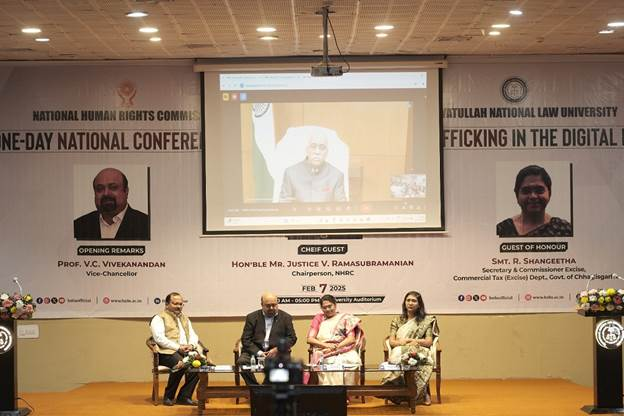NHRC Chairperson Inaugurates National Conference on Combating Human Trafficking in Digital Era
In his concluding remarks, Shri Joginder Singh, Registrar (Law), NHRC, reiterated that combating human trafficking requires a unified global approach.

- Country:
- India
Justice Shri V. Ramasubramanian, Chairperson of the National Human Rights Commission (NHRC) in India, inaugurated a pivotal National Conference on ‘Combating Human Trafficking in the Digital Era.’ Organized by the NHRC in collaboration with Hidayatullah National Law University (HNLU) in Raipur, the conference addressed the alarming rise of human trafficking facilitated through digital technologies.
The conference brought together an esteemed panel of experts, law enforcement officials, academicians, and activists to deliberate on the multifaceted role of the internet, social media, cryptocurrency, and other online tools in enabling trafficking crimes. It also explored the counteracting roles of technology, law enforcement, legal frameworks, and community engagement in preventing these heinous activities.
Justice Ramasubramanian’s Keynote Address
Speaking virtually to the gathering, Justice Ramasubramanian highlighted the evolving landscape of human trafficking, particularly emphasizing digital forms such as sexual exploitation, labor exploitation, organ trafficking, and forced marriage. He elucidated the concepts of "Active Recruitment" or Hook Fishing and "Passive Recruitment" or Net Fishing, explaining how traffickers leverage digital tools to lure unsuspecting victims.
He stressed the urgency of raising awareness about the dangers of digital spaces and called for the fortification of regulatory and institutional frameworks. Justice Ramasubramanian also underscored the need for technological advancements to combat the misuse of digital platforms for trafficking purposes.
Conference Sessions and Key Discussions
The day-long conference was divided into two thematic sessions:
Session 1: The Role of the Internet in Facilitating Human Trafficking and Migrant Smuggling Chaired by Smt. Bhamathi Balasubramanian, IAS (Retd.), and co-chaired by Dr. Sanjeev Shukla, Inspector General of Police, Bilaspur, this session delved into the legal, administrative, and regulatory perspectives of cyber-enabled trafficking. Notable speakers included Dr. K.V.K. Santhy, Professor of Law, NALSAR Hyderabad; Shri Kirtan Rathore, Additional SP, Raipur; and Smt. Pratibha Tiwari, Additional SP, Mahasamund.
Key discussions revolved around:
- The gendered dimensions of human trafficking and the role of digital anonymity.
- Migrant smuggling practices across India, with a focus on recruitment strategies and trafficking networks.
- Case studies from Chhattisgarh highlighting underreporting issues and the pivotal role of Anti-Human Trafficking Units (AHTUs).
- The importance of capacity building and developing Standard Operating Procedures (SOPs) tailored for the digital age.
- Leveraging artificial intelligence, digital forensics, and internet tracking tools to combat trafficking, particularly concerning social media and missing children cases.
Session 2: Preventive Strategies Against Human Trafficking This session emphasized the role of technology, law enforcement, victim support, and community engagement. It was chaired by Dr. Manish Mishra, Joint Director, Chhattisgarh Human Rights Commission, and co-chaired by Dr. Purushotam Chandrakar, Member, Child Welfare Committee (Raipur).
Distinguished panellists included Ms. Pallabi Ghosh, Founder & Director, Impact and Dialogue Foundation (Kolkata); Ms. Chetna Desai; Shri Ritesh Kumar, Child Protection Officer, UNICEF Chhattisgarh; and Prof. (Dr.) Vishnu Konoorayar, Professor of Law, HNLU.
The session underscored:
- The integration of community engagement in anti-trafficking initiatives.
- Strengthening victim support systems through technological innovations.
- The critical role of law enforcement agencies in adapting to digital threats.
- Collaborative efforts among governments, NGOs, technology companies, and individuals.
Concluding Remarks and Recommendations
In his concluding remarks, Shri Joginder Singh, Registrar (Law), NHRC, reiterated that combating human trafficking requires a unified global approach. He emphasized the necessity of collaboration between governments, NGOs, tech companies, and civil society.
The conference culminated with several key recommendations:
- Amendments to The Immoral Traffic (Prevention) Act (ITPA): Introducing clearer distinctions between child and adult trafficking and incorporating cyber trafficking provisions.
- Legal Integration: Establishing formal linkages between the ITPA and the Information Technology (IT) Act to address digital trafficking comprehensively.
- Awareness Initiatives: Promoting self-reporting portals like the Centralized Complaint and Prevention of Women and Children (CCPWC) to enhance public participation in reporting trafficking cases.
- Capacity Building: Equipping and training AHTUs to tackle digital-era trafficking effectively.
- Data Collection: Systematic collection of authentic trafficking data to inform policy-making and interventions.
- Community Engagement: Encouraging active involvement of local communities in preventing and reporting trafficking crimes.
The conference marked a significant step towards addressing the challenges posed by digital technologies in human trafficking and laid the foundation for future collaborative efforts to combat this global menace.










